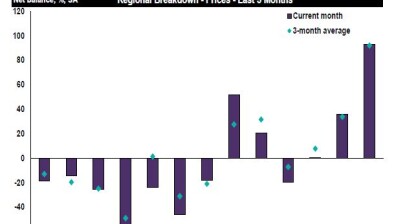Brexit impasse hits Scottish housing market, says RICS
The slump in the Scottish housing market looks set to continue as the ongoing Brexit uncertainty takes its toll on buyers, surveyors have warned.
The UK Residential Market Survey March 2019 from the Royal Institute of Chartered Surveyors (RICS) said the market was still subdued in March, a picture that has been evident in the sales market for several months now, with the lack of momentum likely to continue for the short term.

In March, enquiries from new buyers in Scotland were in negative territory, with a net balance of -9% more respondents seeing a fall rather than rise in buyer demand. Demand fell across all parts of the UK in March. As buyer interest declined, a net balance of -24% of respondents reported a fall in agreed sales at the headline level across the UK in March, with Scottish sales remaining flat.
Looking ahead, near term sales expectations for Scotland are also negative, with a net balance of -11% more chartered surveyors expecting a decline in sales over the next three months. Beyond then, at a headline level there is a little more optimism, with sales anticipated to rise over the coming twelve months.
The ongoing decline in new property coming on to the Scottish market continues, having become progressively weaker in each of the past four surveys, falling from the net balance of -15% in December 2018, to -24% in March 2019. Demand from potential buyers has consistently outpaced new instructions across Scotland for several years now.
Consequently, prices remained firm in March, with 20% of respondents reporting a rise in house prices across Scotland.
In the lettings market, demand from tenants in Scotland dropped for the third successive month (non-seasonally adjusted data) while landlord instructions slipped further. However, rent expectations remain firm, with 26% more respondent predicting an increase in rents, partly due to the continuing decline in available properties.
Simon Rubinsohn, RICS chief economist, said: “Brexit remains a major drag on activity in the market with anecdotal evidence pointing to potential buyers being reluctant to commit in the face of the heightened sense of uncertainty. Whether any deal provides the shift in mood music envisaged by many respondents to the survey remains to be seen but as things stand, there is little encouragement to be drawn from key RICS lead indicators. We expect transactions to decline on this basis.
“Arguably more significant still are the signs that developers are continuing to adopt a more cautious stance with the trend in new residential starts now flatlining. Against this backdrop, there is little possibility of delivering the uplift in supply necessary to address the ongoing housing crisis.”








